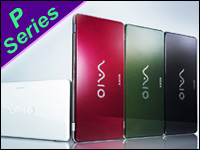
Sony introduced its latest entrant to the ultra mobile PC (UMPC) class of computers on Wednesday at the Consumer Electronics Show (CES) held in Las Vegas. Billed as the world’s lightest 8-inch notebook, the Vaio P Series Lifestyle PC is roughly the size of a business envelope and about as thin as a cell phone. However, unlike most systems in the UMPC category, Sony said the Vaio P is not a netbook PC.
“We don’t call the category ‘netbooks.’ I would call it a ‘mini-notebook’ because it looks and functions like a notebook,” said Bob O’Donnell, an analyst at IDC.
Is That a PC in Your Pocket?
The Vaio P weighs a scant 1.4 pounds and is small enough to fit in a handbag or jacket pocket while offering users the same features they would find in a full-sized notebook or desktop PC.
It includes a 1600×768, LED backlit 8-inch ultra-wide display that incorporates Sony’s Xbrite-Eco LCD technology. The system also features built-in wireless WAN 3G Mobile Broadband, 802.11n WiFi and Bluetooth technologies, which lets users adjust their wireless options to suit their location. They can opt for WiFi while at a local coffee shop or other hotspot, choose Bluetooth to connect with peripherals, or subscribe to and use mobile broadband service via the Verizon Wireless network for trips beyond the scope of a hotspot.
Sony has also added a few smartphone-esque type features to the Viao P. In addition to a webcam that can be used for video chats, the mini-notebooks include real-time GPS functionality that allows users to search for local sites such as restaurants or hotels, and get turn-by-turn directions for specific destinations. The GPS also includes drive times, and in the U.S. and Canada will function without an Internet connection.
A mini, ultraportable machine needs to be highly responsive. Mindful of that fact, Sony equipped the Vaio P with an instant-mode option that launches its XrossMediaBar interface for rapid boot-ups and fast access to music, video, photos and the Internet.
The notebook runs the Windows Vista operating system, supporting office applications and all the software programs typically found on a full-sized machine. To accommodate fingers of all sizes and prevent typing mistakes, the keyboard of the Viao P is engineered to give users the feel of larger notebook. The keyboard extends to the perimeters of the chassis, and spacing between the keys makes it suitable for long fingers, according to Sony.
“You can run anything on it,” said O’Donnell.
The UMPC has up to four hours of battery life with the standard battery and up to eight hours with a larger capacity battery that is sold separately.
The Vaio P will sell for around US$900 and can be preordered starting Wednesday. It will hit store shelves in February.
More Than a Netbook
“It is certainly an interesting device,” IDC’s O’Donnell told TechNewsWorld. “The form factor is good; however, the price is a problem. This is another example of the hyper-specialization of notebooks. We’re seeing everything from different colors to a variety of form factors. You’re seeing [mini-notebooks] in a whole bunch of styles and types.”
The new netbooks and UMPCs that hardware makers have begun rolling out have serendipitously hit the market just when consumers are likely to want alternatives to more expensive full-sized machines.
“There’s clearly interest in lower-cost devices,” said O’Donnell, “and for Sony, $900 is lower-cost. The other thing is, we’re seeing more and more people getting used to having multiple notebooks. They have multiple TVs and PCs. [The Vaio P is] clearly a companion device, and Sony is making moves in a direction that will let people purchase another device.”




















































